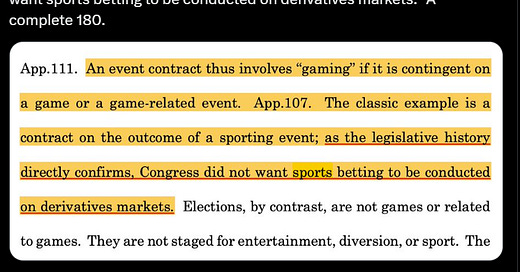Prediction Markets Face Regulatory Crackdown
State regulators argue products offered by such platforms qualify as illegal gambling operations.
New Jersey Division of Gaming Enforcement and Nevada Gaming Control Board have ordered Kalshi to immediately shut down their sports prediction markets for the state’s residents, declaring these innovative financial products illegal gambling operations.
New Jersey regulator also ordered Robinhood to halt its sports prediction market operations for its residents.
The crackdown has ignited legal counterattack, with Kalshi filing lawsuits against both New Jersey and Nevada gaming authorities.
Their argument? Federal oversight from the Commodity Futures Trading Commission (CFTC) should trump state gambling laws—a claim that could redraw the regulatory map for US’s $140 billion sports betting industry.
Why does this matter?
The battle essentially determines whether these prediction markets are sophisticated financial instruments or simply glorified gambling.
Robinhood, which partnered with Kalshi in March 2025 to launch March Madness betting, has reluctantly halted new sports bets in New Jersey while maintaining that its offerings remain perfectly legal under federal rules.
Regulatory Roulette
This clash highlights broader tensions as prediction markets — where users essentially bet on event outcomes ranging from sports championships to presidential elections — continue their mainstream march.
State crackdowns are mounting, with New Jersey's Division of Gaming Enforcement and Nevada's Gaming Control Board wielding state gambling laws as their weapon of choice
Constitutional concerns are heightening scrutiny, particularly as New Jersey's constitution specifically prohibits wagering on college sports involving local teams
Federal-state tensions are intensifying, with platforms arguing that CFTC oversight should preempt traditional state gambling authority
Meanwhile, Massachusetts has joined the regulatory pile-on, with its finance watchdog Bill Galvin taking aim at Robinhood. He launched an investigation into the company's event contracts — calling the whole operation a "gimmick" in comments to Reuters.
The CFTC Wild Card
The CFTC has recently pivoted away from aggressive enforcement under Acting Director Caroline Pham, who in February 2025 signalled a shift toward focusing on fraud rather than broad regulatory actions.
This federal retreat may strengthen Kalshi and Robinhood's case.
Kalshi has already claimed one significant victory by successfully relaunching US election betting in September 2024 after a court-ordered freeze — a precedent that could bolster its current position.
The consequences for both companies could be severe — potential fines, operational restrictions, or lasting reputational damage if their legal challenges fall flat. Victory, however, would cement their position in this rapidly evolving market.
For consumers, this regulatory tug-of-war means increasingly limited access to prediction markets, with New Jersey residents already cut off from sports-related offerings on these platforms.
Prior to these state challenges, the platform weathered a CFTC investigation into Super Bowl-related contracts in February 2025 that ultimately ended without restrictions — possibly indicating a similar outcome here.
Washington state is reportedly considering joining the regulatory pile-on, according to Barrons, suggesting this conflict could spread further across US.
Will prediction markets ultimately be classified as sophisticated financial instruments or just another form of gambling? The answer won't just determine who regulates them, but whether they can continue to operate in their current form at all.






